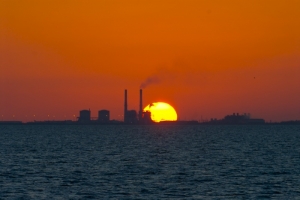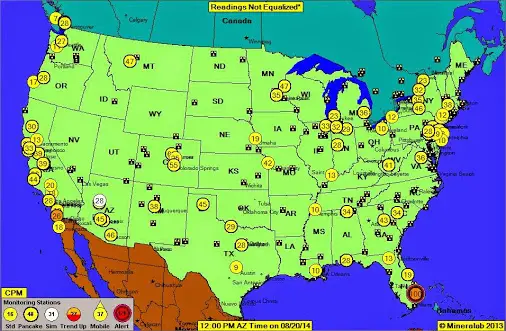By Sayer Ji
Contributing Writer for Wake Up World
New reports indicate a Fukushima-style nuclear disaster may be inevitable in the Miami area, and need to be investigated immediately.
Concerns over the possibility of a Fukushima-like nuclear meltdown event in the U.S. have been growing, with the most likely next disaster predicted (in 2011) to be surprisingly close to Miami Florida, at the Turkey Point facility 20 miles east of Homestead.
According to a 23rd July 2014 NPR story, the Turkey Point facility was found to be (literally) in hot water, over its cooling system, which caused federal regulators to be so concerned that they upped the allowable temperature of the nuclear plant’s cooling system to exceed the normal 100 degree limit for 10 days – up to 103 degrees if necessary. As the plant’s cooling system has come close to 100 degrees, it should mandate an immediate shut down. But instead of exercising precaution, regulators simply increased their legal operating limit, causing environmental groups in nearby Biscayne National Park to express grave concern.
Read or listen to the NPR story, Nuclear Plant May Be In Hot Water Over Its Cooling System, to learn the alarming details – including the following highly disturbing fact:
Instead of using cooling towers, the Turkey Point facility has a canal-based cooling system, technology like something out of the Dark Ages. What happens if that system fails, as it appears to be doing now? Will the non-canal based backup cooling system (diesel-based) work, particularly in a natural disaster situation?
These questions need to be asked and answered, but the most poignant question of all is: Is a core infrastructure failure already occurring, and responsible for the rising temperatures the plant is experiencing?
According to the original Miami New Times exposé published in 2011, the Turkey Point nuclear facility has serious infrastructure issues that make it an extreme risk for a radiation leakage event, or much worse:
It’s old. When Turkey Point went into operation in 1972, it was licensed for 40 years. The U.S. Nuclear Regulatory Commission (NRC) recently “rubber-stamped” another 20 years, allowing the plant to operate until 2033.
“This is uncharted territory”, Saporito says. “They cannot dispute that those reactors may crack from being bombarded with high-level radiation.”
The most concerning evidence was raised by Erin Elizabeth, founder of HealthNutNews, who reported and documented last week that the closest radiation monitor to the Turkey Point station was the highest in the country at 100, which is close to ALERT level – the highest parameter on the scale of concern (as per the only publicly supported, independent real-time radiation monitoring site RadiationNetwork.com). This data would indicate some radioactive source above and beyond background radiation is responsible. See screen shot below taken on 20th August 2014:
On this day, the monitoring station’s readings fluctuated wildly — between 30 and 100. Whatever the cause(s) for these fluctuating radiation levels may be, at very least, an investigation is justified. Also, because the concerning levels of radiation were measured in Del Ray Beach, 80 miles away from the Turkey Point plant facility, everyone in between, including the densely populated city of Miami, would be potentially affected. This anomaly should be taken seriously and an explanation must be provided by those whose responsibility it is to protect the public from nuclear disaster and secure the safety of this facility.
What are the potential implications of this?
We don’t truly know. Following the global suppression of coverage on Fukushima – have you heard anything about it lately? – we can expect similar silence on the subject of this reactor, and all the others that should have been decommissioned decades ago. We need to spread awareness, raise concern, and hope for the best. At the least, we need to acknowledge the significance of a potential meltdown event here in the states.
As reported by the Miami New Times, Thomas Saporito, a Jupiter-based former instrument control technician at nuclear power plants in Florida, Arizona, and Texas, who spent three years at Turkey Point, and who now works as a consultant and nuclear watchdog, the plant’s spent fuels are brimming with danger. In recent interview he stated that the increase in temperatures indicate that “this is uncharted territory”, and also that regulators and plant operators “cannot dispute that those reactors may crack from being bombarded with high-level radiation”.
Also revealed in the Miami New Times report:
“Last June, FPL was fined $70,000 for violations regarding Turkey Point’s spent fuel pools. The negligence “could have resulted in a severe nuclear accident,” Saporito says. “That could be a horrific disaster all by itself.”
If Turkey Point melts down, Miami is doomed. Saporito says there will be no time to evacuate the city to protect ourselves from radiation. If there’s a meltdown, “people are going to die,” he says, “and the entire city of Miami could become a ghost town that nobody can go back to for 50,000 years.”
To confirm the inevitable danger of a nuclear disaster in Florida, a Huffington Post article published in May 2014, “How Rising Seas Could Sink Nuclear Plants On The East Coast“, featured the Turkey Point plant, and revealed that sea level rises will make a nuclear disaster much more likely there unless we start decommissioning it and moving the tons of radioactive materials to safer ground now.
To learn more about the historical worldwide implications of radiation disasters, please read the GreenMedInfo report: Why There Is No “Safe” Level Of Radiation from Fukushima.
Further articles by Sayer Ji:
- Garlic Cures 100% of Warts In Clinical Study
- 7 Simple Ways to Unclog Your Arteries Naturally
- Why Monsanto’s ‘Cure’ For World Hunger Is Cursing The Global Food Supply
- 13 Alternatives to Viagra That Won’t Fall Flat
- Research Proving Vitamin C’s Therapeutic Value in 200+ Diseases
- Sesame Seeds – Ten Amazing Health Benefits Of This Super-Seed
- Biophotons: The Human Body Emits, Communicates with, and is Made from Light
- 3 Evidence-Based Ways To Reverse Skin Aging Naturally
- How to Clean Your Arteries With One Simple Fruit
- 13 Evidence-Based Medicinal Properties of Coconut Oil
- The Spice That Prevents Fluoride From Destroying Your Brain
- Turmeric Beats Ibuprofen for Arthritis of the Knee
- Probiotics Destroy Toxic Chemicals In Our Gut For Us
- Measles Outbreak: a Failing Vaccine, Not a Failure To Vaccinate
About the author:
Sayer Ji is an author, educator, Steering Committee Member of the Global GMO Free Coalition (GGFC), advisory board member of the National Health Federation, and the founder of GreenMedInfo.com – an open access, evidence-based resource supporting natural and integrative modalities. His writings have been published and referenced widely in print and online, including Truthout, Mercola.com, The Journal of Gluten Sensitivity, New York Times and The Well Being Journal.
In 1995 Sayer received a BA degree in Philosophy from Rutgers University, where he studied under the American philosopher Dr. Bruce W. Wilshire, with a focus on the philosophy of science. In 1996, following residency at the Zen Mountain Monastery in upstate New York, he embarked on a 5 year journey of service as a counsellor-teacher and wilderness therapy specialist for various organizations that serve underprivileged and/or adjudicated populations. Since 2003, Sayer has served as a patient advocate and an educator and consultant for the natural health and wellness field.
Visit GreenMedInfo online and on Facebook, or sign up for GreenMedInfo’s Newsletter.

If you've ever found value in our articles, we'd greatly appreciate your support by purchasing Mindful Meditation Techniques for Kids - A Practical Guide for Adults to Empower Kids with the Gift of Inner Peace and Resilience for Life.
In the spirit of mindfulness, we encourage you to choose the paperback version. Delve into its pages away from screen glare and notifications, allowing yourself to fully immerse in the transformative practices within. The physical book enriches the learning process and serves as a tangible commitment to mindfulness, easily shared among family and friends.
Over the past few years, Wake Up World has faced significant online censorship, impacting our financial ability to stay online. Instead of soliciting donations, we're exploring win-win solutions with our readers to remain financially viable. Moving into book publishing, we hope to secure ongoing funds to continue our mission. With over 8,500 articles published in the past 13 years, we are committed to keeping our content free and accessible to everyone, without resorting to a paywall.










